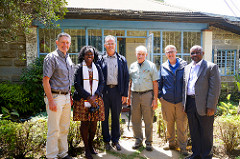
Better Together: FRB and OAIC Form Partnership
Foods Resources Bank (FRB) and the Organization of African Instituted Churches (OAIC) recently announced a partnership agreement that strengthens their efforts to reduce hunger through sustainable agriculture and improved nutrition. By working together, the two organizations will now be able to share a network of learning and deepen their reach into communities at the economic margins of Africa.
“This is an exciting opportunity to create more paths to solving world hunger and learn from each other,” says FRB CEO Marv Baldwin. OAIC joins FRB’s network of 23 partner organizations all focused on creating lasting food security programs in developing countries.”
Adds OAIC Secretary Reverend Nicta Lubaale, “Being African means being resourceful. We are using local resources and teaching sustainable agricultural techniques to transform the way smallholder farmers grow food to improve their yields as well as the nutritional variety of the foods they produce and consume.”
Under-nourishment in Sub-Saharan Africa is a big challenge. The 2015 report of the State on Food Insecurity in the World indicates that 220 million people in Sub-Saharan Africa are living in a state of hunger. In the East African region, 37 million are undernourished. Both FRB and OAIC see agriculture as a lasting solution to hunger. By organizing community groups and providing tools and training to smallholder farmers, these farmers are able to generate sufficient food for their families, share the excess as well as sell some to afford household staples and school requirements for their school-going children.
“Charity never ends poverty,” says Lubaale. “But once you have productive land, you will not go hungry.”
FRB has supported one million people as they have transformed from living in chronic hunger to becoming food secure in its first 15 years and has set a goal to reach the next million in half that time. OAIC is targeting 3,000 congregations and farmers’ organizations to reach 400,000 smallholder farmers in three years. With an average of five family members per household, approximately two million people will realize food and nutritional security and improved incomes through OAIC’s outreach.
